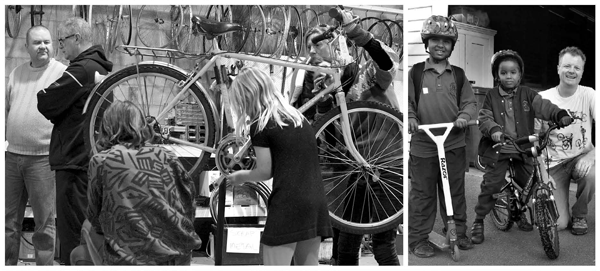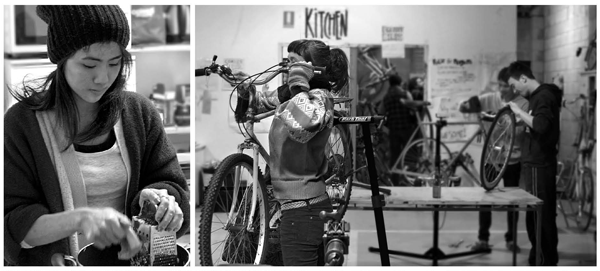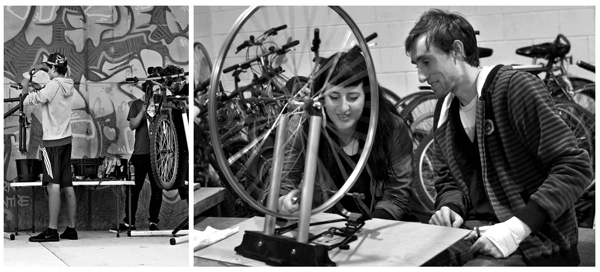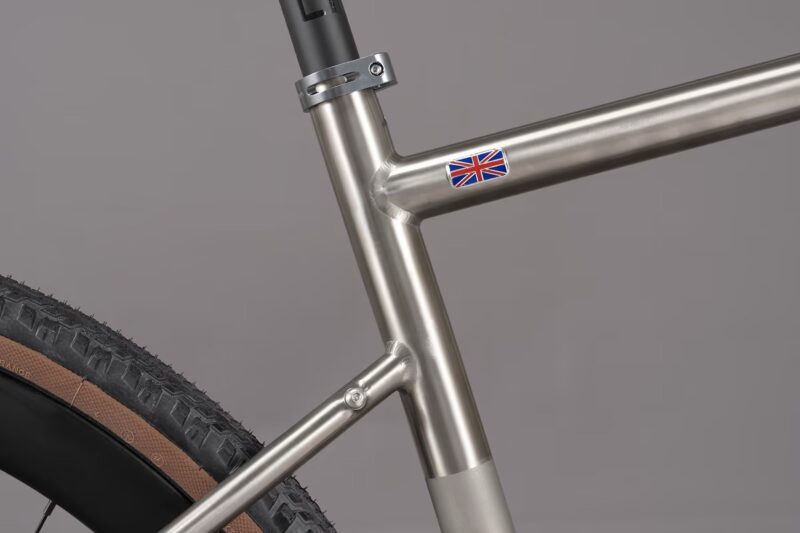Greasing the wheels

Peter Foot finds the good folks getting their hands dirty in order to share the joy of riding.
“I was walking up the laneway the other day,” says Melbourne dad Bart Sbeghen, “and I saw a kid riding my daughter’s bike.” The bike hadn’t been stolen, but had been recycled by the Flemington Primary School Bike Hospital, a program co-founded by Bart and another dad at the school, Peter Hormann.
“Now my daughter knows that (is where her bike has gone) … She can say: ‘Oh, you’ve got my bike, how’s it going?’ You’ve made that connection, you’re building a support network in the school.”
The Bike Hospital recycled its 200th bike in May 2016 – not bad for what started as two dads and a few tools under a tree in the schoolyard. It is just one of many bicycle-centered social enterprises and not-for-profit organisations to have sprung up across the nation in recent years.
“I didn’t expect it to work so well,” admits Bart. “I thought: we’ll do thirty bikes and that will be it. This will last for six months.” That was two years ago.
The original impetus of the Bike Hospital, now growing into Dr Cranky’s, was to help more kids get involved in Bicycle Network’s Ride2School program, and to give kids access to a working bike who otherwise wouldn’t have one.
“(Kids had) bikes that were not working and chains that would keep falling off – bikes with one pedal or one brake. Kids were actually walking their bikes to school just to be involved. So for a few years I was offering repair days two weeks before Ride2School Day.”
Peter and Bart then began to ask for donations.
“We put something in the school newsletter. We said: come along, donate your bikes and we’ll do them up and give them to someone else.”
Clearly, the idea had legs. Since then they have renovated and moved into the ‘bin shed,’ and are now recycling two or three bikes a week. One of the factors contributing to the Bike Hospital’s success is Flemington Primary’s unique demographics – made up of relatively affluent, mainly white families, and relatively poor, mainly African migrants.
“We’ve got a divergent socio-economic demographic: we’ve got people that have access to bikes and people that need them. Ride2School had good support at our school, but what we saw we were missing were those recent migrant families.”
One of the great benefits of the program is that it helps to bridge the divide between these groups.
“I get to meet some of the ethnic community I’ve never met. The people that are helping in the shed get to know them as well. Kids I don’t know are coming up and asking questions. It’s not a hand-me-down sort of thing, it’s more of a collaborative thing. We’re teaching parents and kids how to fix the bikes. And there are some bikes going out to different sorts of families, so it’s not all recent migrants”
Bart has broader ambitions for Dr Cranky’s. He envisages a system that does more than just transfer bikes from one socio-economic group to another.
“Kids bikes… they’re like a pair of shoes; in a year-and-a-half they’ve outgrown them. So what do you do with them? Hopefully this is a system where, if in six-months’ time they’ve outgrown it, you just put it back into the system. If it starts to work properly – especially if you get the crèche and the high-school included – bikes come in, the next group come through and they just recycle through.”
It’s an elegant solution to a common problem: parents often don’t have the money to buy their children several bikes as they grow up, so they buy the largest one the kid can possibly ride in order to make it last. The problem with this is that the bike is hard to control because they struggle to reach the handlebars and the ground. Bart has also been looking to export the model to other schools.
“It’s a social enterprise based on a franchise model. We provide the central resources, the set-up stuff, then they’re off and running. If we can get another two or three schools to trial it, we can assess it, refine it, keep on going. Does it only work at our school because of our demographics? Will it work at schools with a more even income distribution? That’s what I want to explore.”

In the South Australian capital, the Adelaide Bike Kitchen opened its doors in 2012, and has thrived ever since. Inspired by similar projects in Vancouver and Vienna, it’s an old warehouse where people can learn to fix their own bikes, or build one from scratch.
“Around eighty people turned up to the first meeting and it sort of snowballed from there,” says Reb Rowe, the Bike Kitchen’s secretary.
“We really do have anyone and everyone (turning up). The thing that binds people initially is bicycles. If they have an interest in having a bike or fixing their bikes, that’s usually what brings them through the door. But then it’s the connectivity and togetherness of that community that keeps them coming back.
“It’s an environment that’s not intimidating. We try to normalise it as much as possible. We’re not going to judge you if you don’t hold it (the spanner) right or if you turn it the wrong way first. We’re encouraging people just to try it out.”
A key difference between the Adelaide Bike Kitchen and similar organisations around the world is the emphasis on the social side of things.
“Every Wednesday night we have the workshop 5 to 8pm and then a community dinner,” says Rowe. “People will finish their work and then stay around for dinner, so we have people helping each other and making connections through that. We’ve got quite a big social space. We’ve got a number of couches, a tea and coffee station, wi-fi. It’s a space where people can come and feel comfortable to hang out. That’s really what is building the community.
“I’ve been lucky enough to visit some bike kitchens in the US, and I found that when it is just the workshop function, people will come in, work on their bikes and then leave. There’s less mateship.”
This year ABK has also started opening its doors on Thursday night, as well as hosting a monthly “Open Bike Night,” featuring live local music and a licensed bar. “We were conscious that we had quite a large space that was only getting used once a week. The launch of the Open Bike Night a couple of months ago was really successful.”
So how does the Adelaide Bike Kitchen get by financially?
“We charge $2 an hour for using the workshop, the tools and our mechanic’s knowledge. And we ask for a $5 donation for dinner. We also have a ‘project bike’ system that has been really popular: you pay $100 and you get a bike of your choice, as well as a month of membership which means you don’t have to pay the $2 an hour to use the workshop, and you can store your bike on site while you are working on it.
“There’s a very good, supportive community around us. They’ll drop off their bikes or excess produce from their gardens. Three or four bike shops regularly donate parts to us. Sometimes when bike shops close down we’ll get the stuff that they can’t sell. If they’re in good condition we sell them to the public. We also get food donated from the central markets for our Wednesday night meals. If it’s going to the tip or it’s a little past its prime, we’ll get a hold of it and cook it up on that night. It’s all good food, just not sellable.”
And what have been the biggest benefits of ABK to the community?
“There’s a triple bottom line of the environment, the economy and health. It’s keeping the community connected, and keeping people on bikes; there are definitely elements of the community that wouldn’t exist if the bike kitchen didn’t exist.
“(It provides) opportunities for different employment opportunities. A couple of people who have come to volunteer at ABK have come out of Holden, which has closed down here in Adelaide, and they’re looking to re-direct their occupation. And not only have we had skill sets picked up, we’ve had three or four businesses that have come out of people involved in the Bike Kitchen. It’s been an opportunity, for what can be best described as directionless young adults, to come together and work towards a really positive outcome.”
ABK leases an old warehouse owned by Renewal South Australia, a state government body that subsidises the rent. The warehouse, though, is earmarked for demolition in the near future.

Meanwhile, in Fremantle, an organisation called Dismantle has been using bicycles as a vehicle to support disengaged young people since 2011.
“Originally, Dismantle was a public workshop,” says Pearce Selleck, a mechanic with the organisation. “There was a shipping container that was put down in the middle of Fremantle. The idea was that people would pay an annual membership and you could go and use the space and the tools alongside mechanics. And although it was successful it was difficult to maintain it long term. There wasn’t enough financial driver to keep it going. But what spawned out of that workshop was Bike Rescue Project.”
BRP is a program that recruits ‘at risk’ young people from youth centres and prisons, and runs a ten week program where they get to refurbish two bikes, learning valuable skills in the process. The first bike gets donated to a local charity. The second one they get to keep.
“It’s an easy thing to entice a kid with: do this and you get a bike,” says Selleck.
“But the bike aspect is just one component of it. The real core of it is getting these kids alongside mentors and youth workers, and getting them back and engaged with these service providers. They all have different problems in their life whether it be places to stay, places to go … there’s some pretty fundamental issues that are going on with some of the young people.”
The statistics are encouraging: around 200 young people a year complete the BRP, and 75% of them are still engaged in education six months later.
Not long after the BRP began, a mobile bike mechanic service, Bike Doctor, was created as a way of generating revenue for Dismantle, and to provide further pathways and training to some of the kids who have completed the BRP. Bike Doctor recently took some graduates from the BRP to Rottnest Island to help build 300 bikes for a bike hire company.
“For a lot of them it was the first time they had been to ‘Rotto,’ and the first time they needed a tax file number and a superannuation account. Those kind of interactions tend to set these kids up in a much better position for employment down the road. You can get these kids to feel really confident in what they’re capable of, what they can achieve. In the end you’re getting them back into employment or education and that’s what it’s all about.”
These three organisations are only the tip of the iceberg of what is going on in Australia; the country is strewn with groups that are recycling bikes, teaching skills, helping those less fortunate and creating a sense of community while they do it.
When the bicycle was invented, it helped to emancipate women by providing an independent means of transport. In our current world of increasing inequality, congested cities, climate change and spiralling health costs, it has the power to reshape our lives yet again.
Here is a list of some other organisations like those featured in this article.
NATIONWIDE
ACT
NEW SOUTH WALES
- Bicycle Garden, Sydney
- Cycle Recycle Club, Sydney
- Bicycles For Change, Sydney
- Western Sydney Cycling Network
- Bike Love Corral, Newcastle
SOUTH AUSTRALIA
TASMANIA
VICTORIA
- Good Cycles, Melbourne
- Dr Cranky’s, Melbourne
- Back 2 Bikes, Port Melbourne
- The Bike Shed, CERES, Melbourne
- Broadmeadows Bicycle Hub, Melbourne
WESTERN AUSTRALIA
- Dismantle, Fremantle
Ride On content is editorially independent, but is supported financially by members of Bicycle Network. If you enjoy our articles and want to support the future publication of high-quality content, please consider helping out by becoming a member.







